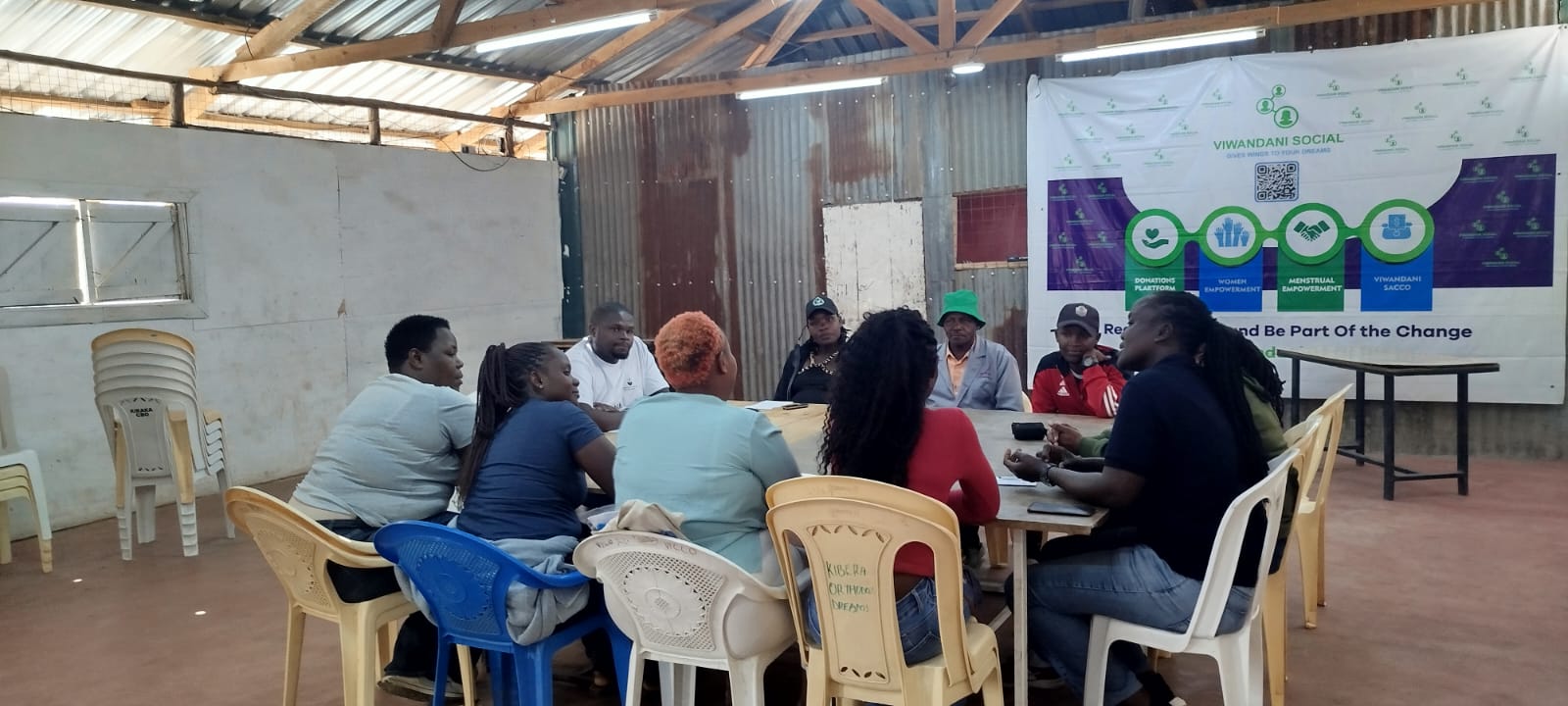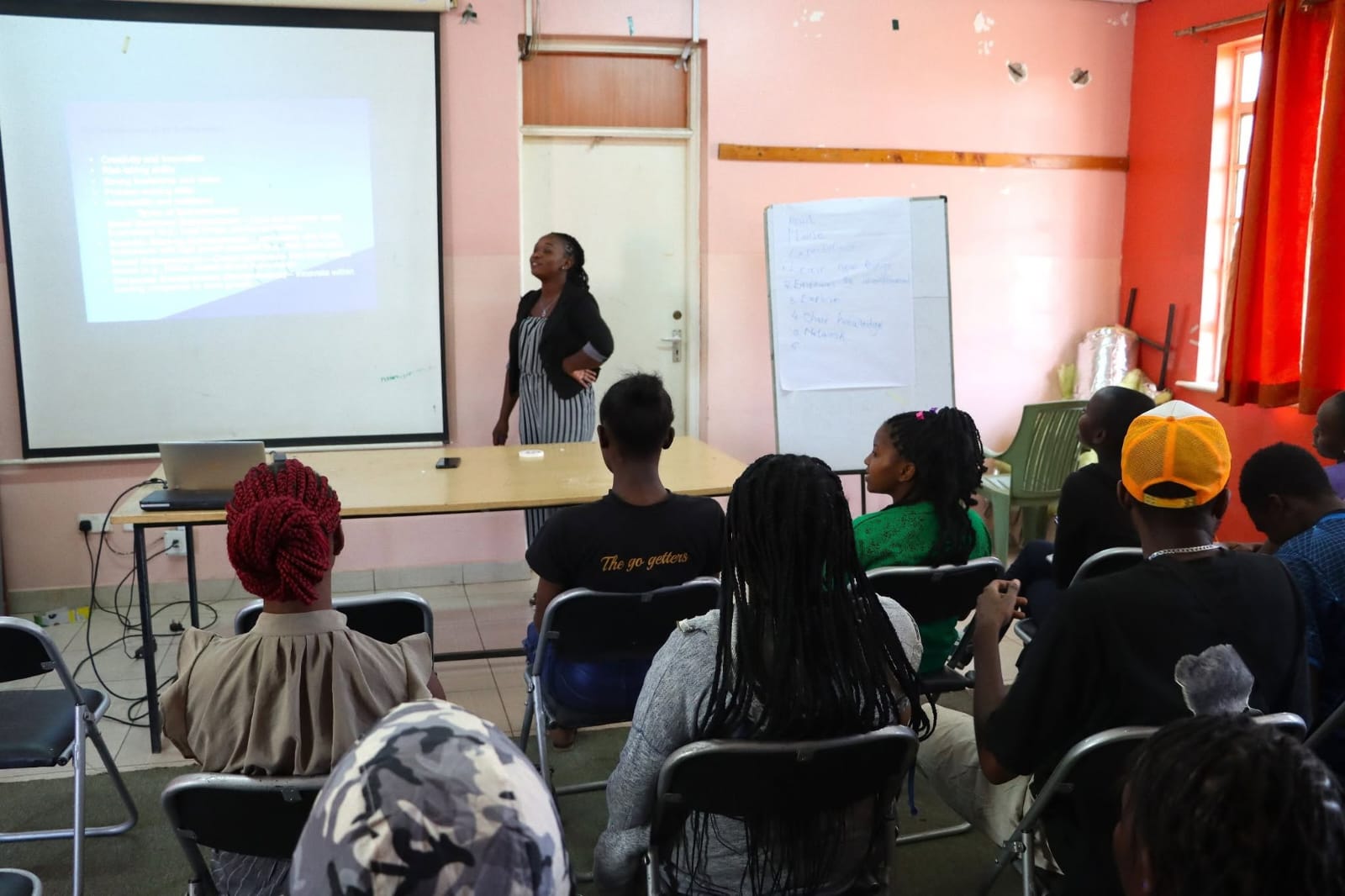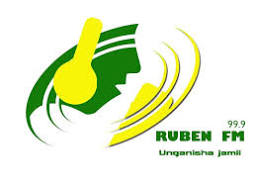FALSE: Photo does not show the drought situation in Embolioi, Kajiado County, in October 2022
COMPLAINTS POLICY
STATION ID: RUBEN FM 99.9
RADIO FREQUENCY: 99.9 FM
AREA OF BROADCASTING: MUKURU SLUMS
Introduction
Ruben Centre is a non-profit making community-based organization striving for an empowered and just Mukuru community by providing quality education, health, financial and social services to children and families in the Slums of Mukuru. It was started in 1986 by Sister Mary Kelleen. It is run by the Christian Brothers African Province and is one of the eight Christian Brother’s project sites across Africa.
Receiving feedback and responding to complaints are important ways for Ruben Centre to improve performance and be accountable. Ruben Centre recognises the value of complaints as an important tool in understanding and responding to stakeholder expectations. Ensuring that our stakeholders can hold us to account will improve the quality of our operations and bring greater impact.
Complaints may come from community members affected by our programs, including children and youth, members of the public, partners and supporters including child sponsors and other donors. Ruben Centre is committed to the timely and fair resolution of complaints.
This policy does not cover complaints by trustees, members, directors, employees, contractors and volunteers of Ruben Centre and others acting on its behalf (together Representatives). These are governed by the Hr Policy or the Child Protection Policy (as appropriate).
ABOUT RUBEN FM
Ruben FM is Mukuru’s community radio station that aims to empower and unite Mukuru Community through our slogan “ UNGANISHA JAMII” .It broadcasts from Ruben Centre, a
faith based organization in Mukuru Kwa Ruben. The radio station was launched on 19th November 2016. Our area of broadcasting is 2.5km radius which covers Mukuru Kwa Ruben slum, Mukuru Kwa Njenga slum, Kware, Imara Daima,Viwandani area, Pipeline and Mukuru Kayaba.
VISION
To empower and unite the Mukuru Community.
MISSION
To offer quality educative, informative and entertaining programs to Mukuru Community
OBJECTIVES
- To strengthen Ruben Centre’s capacity for delivery on its mission.
- To create and deliver development oriented information to the residents of Mukuru.
- To build and increase public awareness in a number of critical issues such as health matters, business and entrepreneurship, environmental awareness and security.
- To enhance the education of school pupils through targeted audio programs.
- To empower individuals and the Mukuru Community as a whole, through education and distribution/dispersal of information.
- To enhance peace and harmony in Mukuru.
Definitions
- Acomplaintis defined as an expression of dissatisfaction about the standards of service, actions or lack of action by Ruben Centre. It could be:
- a criticism relating to one of Ruben Centre’s development programs by a community member, including children and youth, partner or government official;
- dissatisfaction from a supporter, such as a child sponsor, about an aspect of service;
- criticism about a fundraising action or campaign; or concern about the behaviour of staff, volunteers, contractors, suppliers, partners or others acting on behalf of Ruben Centre.
- Acomplainantis any person or organisation making a complaint.
Policy
- Awareness
This complaints policy is intended to provide information to all stakeholders about Ruben Centre’s reporting and complaints procedure. Ruben Centre will equip staff and volunteers with an understanding of the organisation’s approach to complaints response and assist them to effectively implement the policies.
- Accessibility
Ruben Centre will ensure all stakeholders, including children and youth, have clear, effective, safe, confidential and accessible means to make a complaint. The organisation’s complaints procedure is accessible to its stakeholders irrespective of their gender, status or background, and without prejudice to their future involvement with the organisation. Complainants will be treated respectfully, kept informed and supported in exercising their right to make a complaint without fear of discrimination. Ruben Centre will respond to complaints in a fair and timely fashion.
Principles
Clients and stakeholders where Ruben Centre works have a right to complain;
Complaints should be valued and carefully reviewed, as they provide feedback that can help identify areas that may need improvement;
Complaints handling procedures should be used as an opportunity to enhance Ruben Centre’s relationships with stakeholders;
Complaints procedures should be well publicised, easy to understand and accessible to all stakeholders in the appropriate language and through appropriate media;
Children and youth are key stakeholders, and procedures and requirements for filing a complaint need to recognise their particular situation and context given their vulnerable and disadvantaged status;
Complainants should be treated with respect and without prejudice, while recognising the need to be fair to both the complainant and to the organisation or person being complained about;
Complaints should be dealt with in a manner that is timely, responsive, confidential and fair;
If a complaint is not resolved and the complainant remains unhappy, they have a right to appeal and must be informed of this right.
Policy in Action
- Publication of policy
This policy or an appropriate extract will be made available to the public through the website, by verbally informing stakeholders of the policy where appropriate and by providing copies of the policy on request. The policy will be explained in local language if requested.
- Complaints in Ruben Centre program
Complaints to Ruben Centre can be received by telephone, letter or email.
Ruben Centre’s will be responsible for responding to complaints relating to Ruben Centre’s operations. In consultation with the Director of Ruben Centre, the Complaints Handling Officer (CHO) will develop additional procedures in order to fulfil the objects and principles of this policy including putting in place appropriate mechanisms for children and youth to express complaints in a practical and safe manner.
To ensure consistency of response and to manage complaints effectively, the Human Resource Manager (RC’s CHO) will be the person responding to general complaints, including putting in place appropriate mechanisms for children and youth to express complaints in a practical and safe manner. The CHO will make sure that these complaints are either resolved or referred on to the relevant manager or department, and in all cases will keep the CHO abreast of such complaints. If the complaint is about the CHO, then the matter shall be dealt with by the Director directly.
If the complaint is about the Complaints Handling Officer, complaints should be directed to the Director. Receiving complaints can be done in a range of ways and decisions must be made (in conjunction with the local community as appropriate) as to what is most appropriate. In order to establish what the complaint is and its validity, interpreters might be needed. Some complaints about programs and/or staff ways of working may not be able to be resolved easily, and staff may require additional support from Ruben Centre management.
- Information complaints handling procedure
Even if a complaint appears to be without foundation, or is difficult to understand in the form that it is received, all staff are under an obligation to take reasonable steps to clarify the complaint and obtain additional information that will assist in the assessment and ultimate resolution of the complaint.
Many complaints will be raised informally, and dealt with quickly by staff. An informal approach is usually appropriate and should be used as often as possible. Staff to whom a complaint is made can offer solutions consistent with their normal level of authority. Where the likely solutions appear to require approval from a higher authority, or if requested by the complainant the matter can be referred to a higher staff level.
If complaints cannot be satisfactorily resolved informally, the formal complaint handling procedure will be followed (outlined in part 4 below).
- Formal complaints handling procedure
When a complaint cannot be resolved quickly and informally, or is determined by the complaints’ Handling Officer to be of a very serious nature the following procedure should be used:
The complaint’ Handling Officer will do so in a positive manner and will record the following details:
- The name of the person/s making the complaint;
- The date, time and location the complaint is received; and
- A brief description of the complaint.
The staff person receiving the complaint must refer the complaint to the Complaints’ Handling Officer immediately.
The Complaints Handling Officer (CHO) will explore options and solutions that may help to resolve the concern. At all times the complainant will be treated respectfully and, if the complainant is a child or youth, particular care and attention will be given. A brief record of the discussion and any agreed actions will be made.
The Complaints Handling Officer is responsible for ensuring that follow up action occurs in a timely fashion. A brief record of the actions taken will be made and copies of any correspondence or other communication will be kept.
If the complaint is unable to be resolved by the Complaints Handling Officer, an acknowledgement of the complaint is to be sent by email or letter to the complainant within 5 working days of the complaint being received and an approximate timeframe given for the complaint to be fully resolved.
Complaints that have not been resolved by the Complaints’ Handling Officer as applicable to the satisfaction of the complainant will be referred to the Director for review.
The Director will review the matter and may:
- reconsider the original decision and take additional corrective action;
- overturn previous decisions and institute new measures considered necessary; and/or endorse the action that has already been taken with no further action required.
- If the matter is still unresolved and appears to require additional action it will be referred to the Chair of the Board for review.
- The Chair of the Board has the option to refer the matter to an external mediator or alternative dispute resolution agency if this is considered to be the most appropriate option.
- If the complaint involves the Director, it should be referred to the Chair of the Board. If the complaint is about the Chair of the Board, it must be referred to the Board and the Chair will have no voting rights as to how the matter is to be dealt with.
Depending on the nature of the complaint, variations to the above procedures may apply.
- Triage system for classifyingcomplaints
Once a complaint has been received, the Complaints’ Handling Officer will apply the Complaints Triage Framework to determine the relevance of the complaint, the severity of the risk posed and what steps should be taken to protect the safety of the stakeholders involved and ameliorate the conditions that led to the incident.
The Complaints Triage Framework makes Ruben Centre’s complaints assessment process impartial, transparent and responsive. The Complaints Triage Framework has the following purposes:
- todetermine whether a complaint falls within or outside the scope of this For guidance on how the Complaints’ Handling Officer is to act when a complaint is deemed to be outside the scope of this policy.
- to determine whether a complaint concerns a high-risk incident (issues of PSEAH, whistleblowing, terrorism or fraud).
- to guide the Complaints’ Handling Officer of the appropriate response to varying levels ofrisk;
- when multiple complaints are received at once, to ensure that more urgent complaints are processed to the front of the ‘queue’ and are addressed with greater immediacy than those that pose a lower risk.
The objective of the Complaints Triage Framework is to allocate a risk level to each lodged complaint. Guidelines for how to allocate risk levels, with accompanying examples are included in the framework below:
Complaints Triage Framework:
| Risk level | Guidelines | Example |
| Low | – Able to be dealt with locally
– No external implications – This includes compliments and incidents |
– A supporter submits a compliment
– A supporter advises Ruben Centre of their marketing and communications preferences |
| Medium | – Concerns a one-off breach of Ruben Centre’s policy / laws / regulations
– Poses an impact on operations / financial implications – Requires corrective action at an individual level – No external implications |
– A Partner expresses dissatisfaction about the inefficient internal processes of their Project – Ruben Centre is made aware of a stakeholder who has ignored its Privacy Policy |
| High | – Concerns an ongoing breach of Ruben Centre’s policy
/ laws / regulations – Poses an impact on operations / financial implications – Requires corrective action at an organizational level – The wellbeing or safety of a stakeholder is at risk – Potential interest from external regulatory authorities – Risk of reputational damage, adverse PR or media attention
– A complaint is lodged concerning: o child safeguarding o PSEAH o whistleblowing o terrorism o corruption or fraud |
– A complaint is made regarding a beneficiary’s wellbeing or safety
– Ruben Centre is made aware of an ongoing breach of policy or Staff misconduct |
- Process for responding to high-riskcomplaints
A complaint that concerns a high-risk incident, that is, any incident that concerns a case of SEAH, whistleblowing, terrorism or fraud is to be allocated a risk level of extreme. The Complaints’ Handling Officer is to immediately refer to the policy of the relevant incident and carry out the required procedures.
- Foralerts of child safeguarding incidents, Ruben Centre’s Child Safeguarding Policy is to be
- For complaints of sexual exploitation, abuse or harassment (SEAH), Ruben Centre’s Prevention of SexualExploitation Abuse and Harassment (PSEAH) Policy is to be
- Fordisclosures of wrongdoing originating from internal stakeholders, Ruben Centre’s Whistleblowing Policy is to be
- Forcases of terrorism or associated criminal activity, Ruben Centre’s Counter-Terrorism Policy is to be consulted.
- For cases of fraud, corruption or financial wrongdoing, Ruben Centre’s Anti-Corruption & Anti-Fraud Policy is to beconsulted
- Statement of Commitment
Ruben Centre appreciates and values complaints from all our stakeholders as they provide feedback that can crucially help to identify the areas that may need improvement. Complaints handling procedures is used as an opportunity to enhance Ruben Centre’s relationships with its stakeholders.
Ruben Centre commits that all complaints triaged as ‘high risk’ as highlighted above, will be escalated to the ERFA CEO within 24 hours for the appropriate action to be taken.
- Recording of complaints
Recording of details of complaints should be kept at Ruben Centre’s Complaints Handling Officer’s offices, in a file marked “Record of Complaints”. The file shall be the responsibility of the Complaints’ Handling Officer. If no appropriate record exists a new file will be created for the purpose of recording the complaint.
- Radio Complaints
Ruben FM consumers (radio listeners) are encouraged to forward their complaints through the following channels; this can be done in either Swahili or English languages. Where the complainant cannot write or read, clause 10 below will be applicable.
- Direct Messages through official studio number – 0797146710
- Call the Station Manager through our office number – 0730784409
- Visit either the Station Manager or Production Manager and record the complaint. The officer handling the case will record it in our complaints handling log.
- Send your complaint to our official emails rubenfm@rubencentre.orgor stationmanager.rubenfm@rubencentre.org
- Write a letter to Ruben FM office with your complaint
- Face to face discussion with our complaints handling officers is also encouraged
Ruben FM Complaint Handling Officers
- Thomas Ochieng’- Station Manager – 0701061016
- Joseph Oluoch – Production Manager- 0729801077
- Complaints Handling for people with Special Needs
Ruben FM encourages people with Special Needs to report their complaints through the following ways;
- The radio in partnership with our special needs department at Ruben Centre shall provide sign language interpreter to help handle complaint cases from the deaf and any other person not able to speak
- Visually impaired persons will be aided by our security team to get to the office and record their complaints
- People using wheelchair shall also be aided to access our offices to record their complaints
NOTE: Our complaints Handling Officer shall ensure that all cases are handled within two weeks as stipulated by Communications Authority of Kenya.
APPENDIX I – for Radio complaints only
Details of complaint |
Please complete these details in full. |
| Radio Frequency | |
| Programme/Advert Title | |
| Programme date: dd/mm/yr. | |
| Time of broadcast |
| Is the complaint an infringement of? | Please select relevant category |
| (1) Objectivity & Impartiality in news
|
|
| (2) Fairness, Objectivity & Impartiality in current affairs | |
| (3) Harm & Offence (Code of Programme Standards) | |
| (4) Law & Order | |
| (5) Privacy of an individual | |
| (6) General Advertising Code | |
| (7) Children’s Advertising Code |
Please complete this section, summarising the main points of your complaint (alternatively, you may attach your complaint to this form).
|
|
| Complainant: | Please complete these details in full. |
| Surname | |
| First Name | |
| Mr. / Mrs. / Ms. | |
| Address | |
| Daytime Phone Number | |
| Email (if applicable) | |
| Fax Number (if applicable) |
| Date (form completed): |
To finish, please read through the above form to ensure all your details are correct.
Note: Ruben







